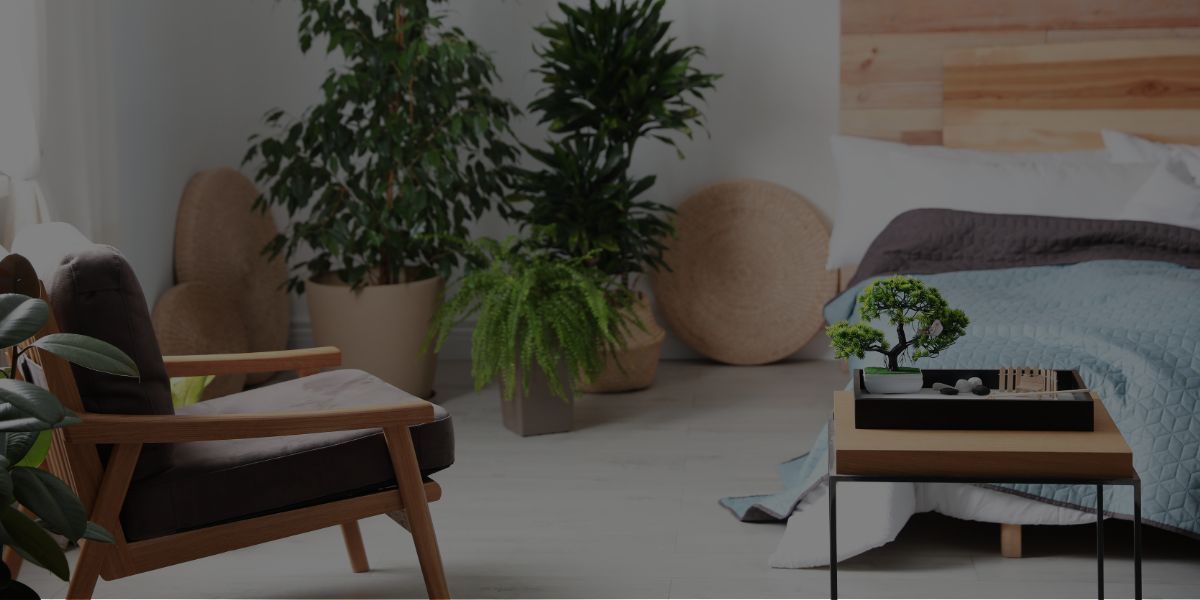If you’re new to Feng Shui, or just looking for a quick refresher, then you’re in luck! In this article, we’re outlining the ultimate list of Feng Shui dos and don’ts for each room in your home. As an added bonus, we’ll also reveal what you should and shouldn’t do in your office space.
By following these simple tips, you can help bring positive energy into your life and achieve better success and harmony in all areas of your life!
Pro Tip: New to Feng Shui design? Learn everything you need to know to get properly introduced to the concept!
What Is Feng Shui?
Before we jump into the Feng Shui dos and don’ts, let’s quickly go over what Feng Shui actually is. In short, Feng Shui is the ancient Chinese art of placement. It’s based on the belief that everything in our environment affects our energy, or Chi.
By making small changes to our surroundings, we can create big shifts in our lives. For example, if you’re looking to attract more love into your life, you might want to add a few pink or red accents around your home. Or, if you’re wanting to improve your finances, you might want to introduce some green decor.
Basically, Feng Shui is all about creating balance and harmony in our lives by paying attention to the energy around us.
What Are The Rules Of Feng Shui?
Form School Vs. Compass School
Generally speaking, there are two types of Feng Shui: Form School and Compass School.
Form School Feng Shui is all about the placement of objects in your environment. It’s based on the belief that certain objects can either promote or block Chi energy.
Compass School Feng Shui, on the other hand, is focused on the cardinal directions and how they relate to your life. This type of Feng Shui is often used when trying to identify the best placement for your home or office.
The 5 Elements of Feng Shui
When it comes to Feng Shui “rules”, another important concept to understand is the 5 elements:
- Wood
- Fire
- Earth
- Metal
- Water
Each element is associated with a specific color, direction, season, and emotion.
For example, the element of fire is associated with the color red, the south direction, summertime, and feelings of passion and anger.
In Feng Shui, it’s believed that we can bring balance into our lives by incorporating all 5 elements into our environment.
Yin and Yang
Another key rule of Feng Shui focuses on Yin and Yang.
Yin energy is associated with feminine qualities like patience, intuition, and receptivity. Yang energy, on the other hand, is associated with masculine qualities like action, decision-making, and assertiveness.
In Feng Shui, it’s important to create a balance of Yin and Yang energy in our lives. We can do this by paying attention to the amount of light, dark, and bright colors in our environment.
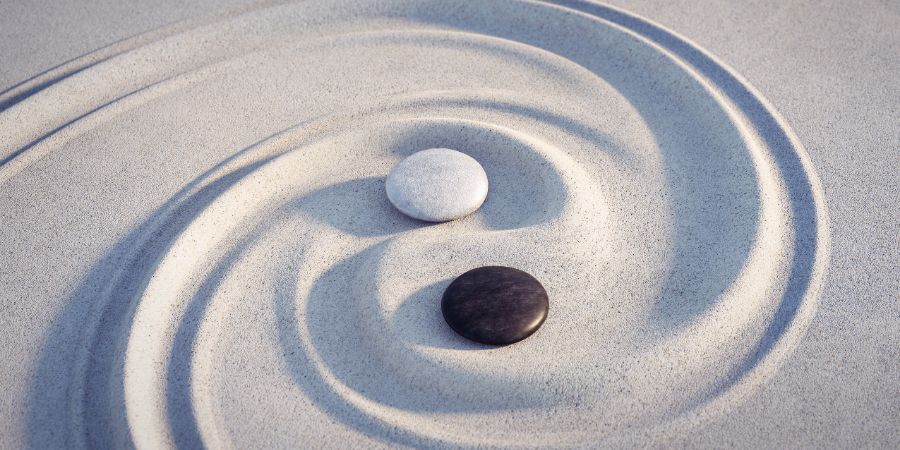
Chi
Next, we have Chi.
Chi is the universal life force energy that flows through all living things. In Feng Shui, it’s believed that our personal Chi energy can be affected by our surroundings.
By making small changes to our environment, we can help encourage positive Chi energy to flow into our lives. This, in turn, can help us achieve our goals and live a more harmonious life.
The Celestial Animals
Another concept/rule to take into consideration is the celestial animals.
In Feng Shui, there are 4 celestial animals that represent different areas of our lives, which are the:
- Green Dragon (Career)
- White Tiger (Relationships)
- Black Tortoise (Health)
- Red Phoenix (Wealth)
By paying attention to the placement of these animals in our environment, we can help encourage positive energy to flow into these areas of our lives.
Bagua
Last but not least, we can’t discuss Feng Shui rules without touching on the bagua map.
The bagua map is an energy map that helps us to understand how different areas of our lives are interconnected. It’s divided into 9 sections, each of which represents a different area of life, such as:
- Career
- Knowledge
- Family
- Wealth
- Fame
- Love
- Health
- Creativity
- Helpful People
By understanding the bagua map, we can start to see how different areas of our lives are connected. We can then use this knowledge to make changes in our environment that will encourage positive energy flow into all areas of our life.
Pro Tip: Become a master of the bagua map with the help of this 2-part blog series!
The Feng Shui Dos
Before we break down the Feng Shui dos and don’ts for each individual room in your home, let’s first take a look at some of the general practices you should always follow in ALL spaces:
1. Use The Right Colors
When it comes to Feng Shui, certain colors are thought to be more auspicious than others.
The best colors to use in Feng Shui are:
- Black
- Blue
- Brown
- Green
- Grey
- Orange
- Pink
- Purple
- Red
- White
- Yellow
These colors are thought to promote positive energy flow, so it’s best to use them as much as possible in your Feng Shui design.
Lucky Colors
It’s also worth keeping in mind that for every calendar year, there are what’s known as “lucky colors”.
For example, this past year (in 2022), the lucky colors were:
- Green
- Brown
- Yellow
And for the upcoming year (2023), the lucky colors will be:
- Black
- Blue
- Red
If you really want to up your Feng Shui game, try incorporating the lucky colors of the given year into your design!
2. Use The Right Materials
In addition to using the right colors, it’s also important to use the right materials in your Feng Shui design.
The best materials to use are:
- Bamboo
- Crystal
- Glass
- Jade
- Metal
- Paper
- Plastic
- Wood
These materials are thought to promote positive energy flow, so it’s best to use them as much as possible in your Feng Shui design.
3. Avoid Clutter
One of the most important Feng Shui rules is to avoid clutter at all costs!
Clutter is thought to block positive energy flow, so it’s important to keep your space as clean and organized as possible. If you have any items that you don’t use on a regular basis, it’s best to get rid of them.
4. Let In The Light
Another important Feng Shui rule is to let in as much natural light as possible.
Natural light is thought to promote positive energy flow, so it’s important to make sure your space is well-lit. If you can, try to position your furniture in a way that will allow for maximum light exposure.
5. Incorporate Plants
Plants are another important element of Feng Shui design.
Plants are thought to promote positive energy flow, so it’s important to incorporate them into your design as much as possible. If you can, try to position your plants in a way that will allow for maximum light exposure.
6. Use Feng Shui Symbols
Feng Shui symbols are another important element of Feng Shui design.
There are many different Feng Shui symbols, each of which is thought to promote positive energy flow in a specific area of life. Some of the most popular Feng Shui symbols are:
If you’re not sure which Feng Shui symbols to use in your design, a good place to start is by incorporating the symbols that represent the areas of life that are most important to you.
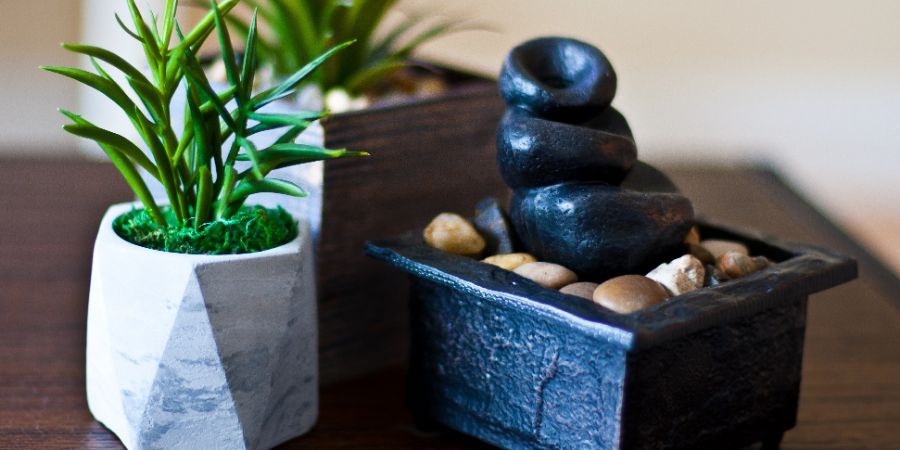
What Not To Do In Feng Shui
In contrast to the 6 dos listed above, there are also some general Feng Shui don’ts that you should NEVER commit, regardless of the room…
1. Don’t Use Sharp Corners
One of the most important Feng Shui rules is to avoid sharp corners.
Sharp corners are believed to create negative energy, so it’s best to avoid them if possible. Instead, try to use rounded or curved shapes in your environment.
2. Don’t Use Broken Objects
Another important rule is to avoid using broken objects in your Feng Shui design. Broken objects are believed to represent broken energy, which can lead to negative vibes in your environment.
3. Don’t Use Clutter
Clutter is one of the biggest Feng Shui no-no’s!
First, it’s unsightly. Secondly, it’s also believed to block positive energy from flowing through your space. So, if you want to create good Feng Shui in your environment, it’s important to keep things clean and tidy.
4. Don’t Use Negative Words
Another thing to avoid using in your Feng Shui design are negative words. For example, words like “hate,” “death,” or “sickness.” In terms of home design, you would want to avoid using these words on objects like throw pillows, paintings, or even in the name of your business.
Another thing to avoid using in your Feng Shui design are negative words. For example, words like “hate,” “death,” or “sickness.” In terms of home design, you would want to avoid using these words on objects like throw pillows, paintings, or even in the name of your business.
5. Don’t Use Poisonous Plants
Last but not least, you should also avoid using poisonous plants in your Feng Shui design. Examples of poisonous plants include:
- Ricinus communis (castor bean)
- Abrus precatorius (jequirity pea)
- Datura stramonium (jimsonweed)
All of these plants are poisonous if ingested, so it’s important to avoid using them in your living space. Poisonous plants are believed to emit negative energy, so it’s best to avoid them if possible.
The Dos and Don’ts To Feng Shui: A Room-By-Room Guide
Now that we’ve gone over some of the basic Feng Shui rules, let’s take a look at the Feng Shui dos and don’ts for each room in your home…
Living Room Feng Shui Dos and Don’ts
The living room is one of the most important rooms in your home, so it’s important to make sure you get the Feng Shui right. Here are some general Feng Shui tips to keep in mind for your living room:
DO
1. Position your furniture in a way that allows for maximum light exposure.
The reason this is so important is because light is believed to promote positive energy flow. So, when placing your furniture, be sure to face it towards the light source (e.g. a window).
2. Incorporate plants into your design.
Plants are believed to promote positive energy flow and purify the air. So, if you want to create good Feng Shui in your living room, be sure to incorporate some plants into your design. Some good plants to have in the living room area include:
- Aloe vera
- Bamboo
- Ficus
3. Use the Feng Shui element of fire in your design.
The element of fire is believed to promote passion, energy, and enthusiasm. So, if you want to create a more lively and energetic living room, be sure to incorporate the element of fire into your design.
4. Consider function.
When designing your living room, it’s important to consider function. After all, this is the room where you’ll be spending most of your time. So, make sure to design it in a way that allows for maximum comfort and enjoyment.
5. Keep things clean and tidy.
As we mentioned before, one of the most important Feng Shui rules is to keep things clean and clutter-free. So, if you want to create good Feng Shui in your living room, be sure to keep things tidy. Examples of how you can achieve this include (but aren’t limited to):
- Investing in storage solutions (e.g. shelves, cabinets, etc.)
- Putting away any unnecessary items
- Donating or selling any unused items
6. Use the Feng Shui element of earth in your design.
The element of earth is believed to promote stability and balance. So, if you want to create a more peaceful and calming living room, be sure to incorporate the element of earth into your design.
7. Place furniture in a commanding position.
When positioning your furniture, be sure to place it in a commanding position. This means that you should be able to see the door from where you’re sitting. The reason this is so important is because it allows you to be in control of who and what comes into your space.
8. Be mindful of where you put your TV.
When it comes to the TV, you should be mindful of where you place it. For example, if you have a sleek flat screen (which most of us have nowadays), it’s advised that you mount it on a wall. This way, it won’t crowd the space.
That said, if you have something in the room that you wish to be the focal point (such as a fireplace), you shouldn’t hang your TV above that focal point. Otherwise, it’ll pull focus and create an unwanted distraction.
9. Create balance.
When designing your living room, it’s important to create balance. This means that you should use a mix of light and dark colors, as well as a mix of hard and soft furnishings. Furthermore, you should make use of both positive and negative space.
By doing this, you’ll create a more balanced and harmonious room!
10. Choose the right color(s).
Obviously, there’s no one right answer to which color(s) you should paint and use within your living room. After all, everyone has their own personal preferences. That said, though, there are certain colors that are believed to promote certain energies.
So, if you’re looking to create a certain type of energy in your living room, be sure to use the corresponding color. For example, if you want to promote relaxation and calmness, you might want to use blue. However, if you want to create a more lively and energetic space, you might want to use red.
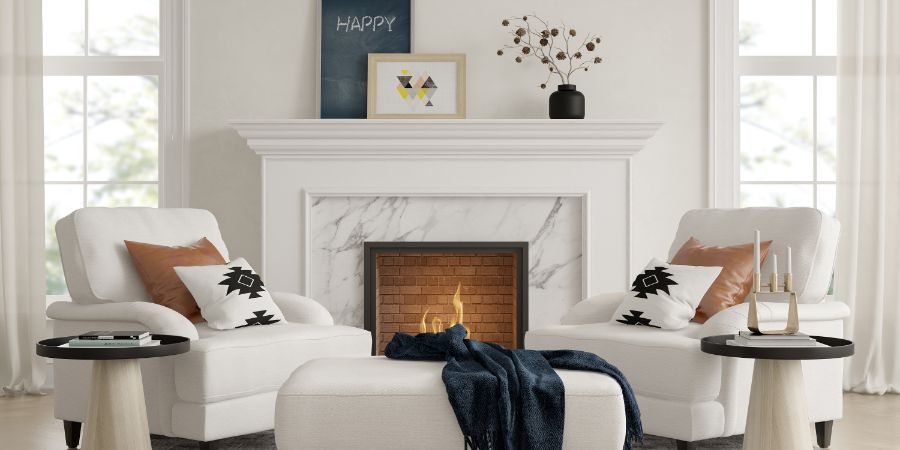
DON’T
1. Use too many colors.
While it’s important to use color in your design, you shouldn’t use too many colors. Otherwise, your space will look and feel chaotic. Instead, stick to a limited color palette (preferably no more than three colors). This way, your space will look and feel more cohesive.
2. Use too much furniture.
Another common Feng Shui mistake is using too much furniture. Not only does this make your living room look and feel cluttered, but it can also make it feel cramped and small. So, be sure to use only the necessary pieces of furniture.
3. Ignore the flow of energy.
When designing your living room (or any room, for that matter), it’s important to consider the flow of energy. This means that you should arrange your furniture and décor in a way that allows for smooth and uninterrupted energy flow.
4. Place furniture too close to the walls.
One of the most common Feng Shui mistakes is placing furniture too close to the walls. Not only does this make your living room look and feel smaller, but it can also block the flow of energy. So, be sure to leave some space between your furniture and the walls.
5. Hang photos or artwork too high.
Another common Feng Shui mistake is hanging photos or artwork too high. This is said to cause the energy in the room to become scattered. So, be sure to hang your photos and artwork at eye level.
PRO TIP: Interested in becoming a professional Feng Shui design consultant? Discover how to get certified and launch your very own business in just 7 easy steps!
Kitchen Feng Shui Dos and Don’ts
DO
1. Keep the stove clean.
One of the most important Feng Shui kitchen tips is to keep your stove clean. This is because your stove represents your ability to nourish yourself. So, if your stove is dirty, it’s said to represent a blockage in your ability to nourish yourself.
2. Make sure the fridge is stocked.
Another important Feng Shui kitchen tip is to make sure your fridge is always stocked. This is because your fridge represents your ability to nourish your family. So, if your fridge is empty, it’s said to represent a blockage in your ability to nourish your family.
3. Keep the sink clean.
Another important Feng Shui kitchen tip is to keep your sink clean. This is because your sink represents your ability to cleanse and purify yourself. So, if your sink is dirty, it’s said to represent a blockage in your ability to cleanse and purify yourself.
4. Keep the floors clean.
Another important Feng Shui kitchen tip is to keep your floors clean. This is because your floors represent your foundation. So, if your floors are dirty, it’s said to represent a blockage in your foundation.
5. Keep the windows clean.
Another important Feng Shui kitchen tip is to keep your windows clean. This is because your windows represent your ability to see clearly. If your windows are dirty, it’s said to represent a blockage in your ability to see clearly.
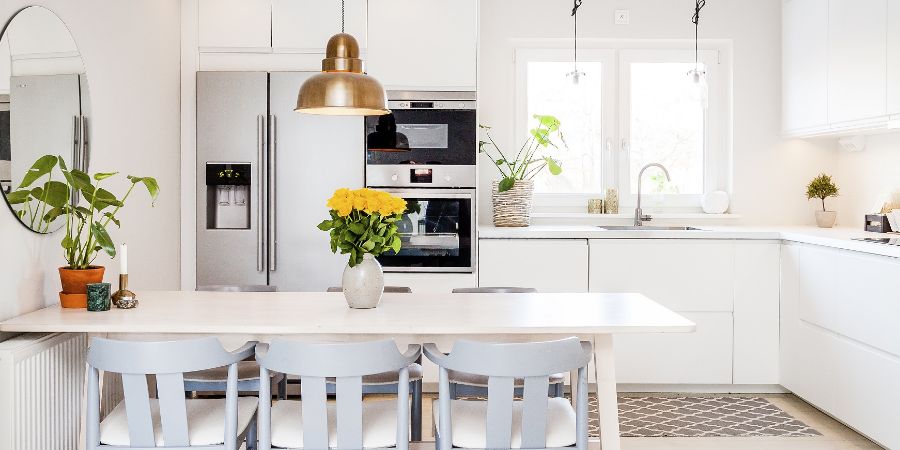
6. Be mindful of decor.
When it comes to Feng Shui kitchen tips, one of the most important is to be mindful of your decor. This is because your kitchen is said to represent your health. So, if you have unhealthy or toxic decor in your kitchen, it’s said to represent a blockage in your health.
Examples of good decor to incorporate into your kitchen can include:
- Fresh flowers
- Green plants
- Bright and cheerful colors
- Healthy and nourishing foods in a beautiful fruit bowl on the counter
7. Bring in some nature.
Another important Feng Shui kitchen tip is to bring in some nature. This is because nature is said to represent health and vitality. So, if you bring in some nature into your kitchen, it’s said to represent a boost in your health and vitality.
Some ways you can bring nature into your kitchen include:
- Placing a vase of fresh flowers on the counter
- Hanging a plant from the ceiling
- Putting a bowl of fruit on the table
8. Be mindful of appliances.
When it comes to Feng Shui kitchen tips, one of the most important is to be mindful of your appliances. This is because your appliances are said to represent your health. So, if you have unhealthy or toxic appliances in your kitchen, it’s said to represent a blockage in your health.
Examples of unhealthy and/or toxic appliances would be:
- An old fridge that leaks toxic chemicals
- A stove that emits unhealthy fumes
- An oven with faulty wiring
9. Use soothing colors.
When it comes to Feng Shui kitchen tips, one of the most important is to use soothing colors. This is because your kitchen is said to represent your health. So, if you use soothing colors in your kitchen, it’s said to represent a boost in both your physical and mental wellbeing.
Some examples of calming and soothing colors you can use in your kitchen are:
- Blues
- Greens
- Purples
- Yellows
10. Take the bagua map into consideration.
The bagua map is a Feng Shui tool that helps you to determine which areas of your home are associated with which life aspects. When it comes to the kitchen, the areas of the bagua map that are most relevant are:
- Career – The stove
- Health – The sink
- Relationships – The fridge
- Wealth – The pantry
So, what are you supposed to proactively do with regards to this? Well, one Feng Shui tip is to try and keep these areas of your kitchen clean, organized, and free from clutter. This is because it’s said to represent a blockage in the flow of energy for these life aspects.
DON’T
1. Leave the sink full of dirty dishes.
One of the worst Feng Shui kitchen mistakes is leaving the sink full of dirty dishes. This is because your sink represents your ability to cleanse and purify yourself. So, if your sink is full of dirty dishes, it’s said to represent a blockage in your ability to cleanse and purify yourself.
2. Put the trash can in the wrong location.
Another common Feng Shui kitchen mistake is putting the trash can in the wrong location. For instance, it’s said that your trash should be out in the open. Similarly, it’s also said that your trash should not be in close proximity to your food. This is because it’s said to represent a contamination of your food.
In addition to being seen as a contamination of your food, having your trash in the wrong place can represent your ability to let go of what no longer serves you. So, a better place to put your trash would be in a cupboard or under the sink.
3. Have knives within reach of the stove.
Another Feng Shui kitchen no-no is to have knives within reach of the stove. This is because your stove represents your ability to cook and nourish yourself. So, if you have knives within reach of your stove, it’s said to represent a danger to your ability to cook and nourish yourself.
Instead, keep your knives stored in a drawer or in a block on the counter that is out of reach of the stove.
4. Use too many appliances.
When it comes to Feng Shui kitchen tips, one of the most important is to not use too many appliances. This is because your appliances are said to represent your health. So, if you have too many appliances in your kitchen, it’s said to represent a blockage in your health.
5. Use harsh lighting.
Now, you might see this one and think, “But I thought having good lighting was a Feng Shui do…”
And while that is true, there is a caveat. The lighting in your kitchen should not be harsh. This is because your kitchen is said to represent your health. So, if you have harsh lighting in your kitchen, it’s said to represent a blockage in your health since it’s said to be tiring on the eyes.
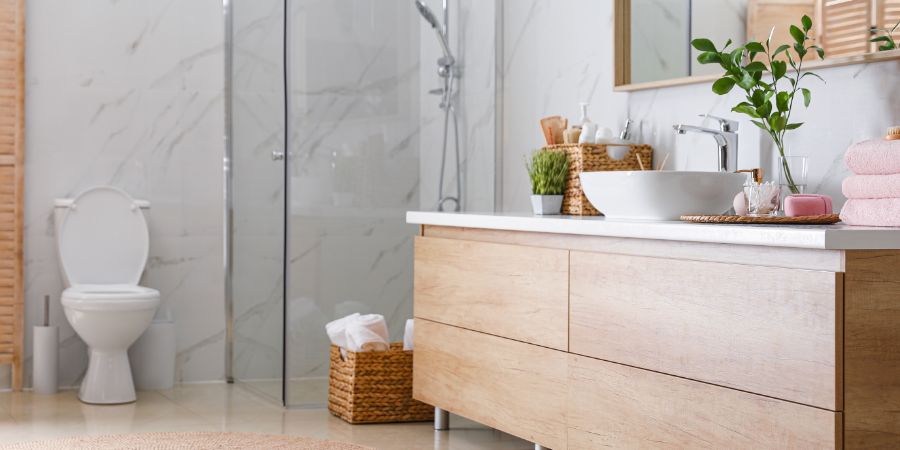
Bathroom Feng Shui Dos and Don’ts
DO
1. Keep the bathroom clean and clutter-free.
One of the most important Feng Shui bathroom tips is to keep the bathroom clean and clutter-free. This is because your bathroom is said to represent your ability to cleanse and purify yourself. So, if your bathroom is cluttered or dirty, it’s said to represent a blockage in your ability to cleanse and purify yourself.
2. Use plants to purify the air.
Another Feng Shui tip for the bathroom is to use plants to purify the air. This is because your bathroom is said to be a place of cleansing and purification. So, if you have plants in your bathroom, it’s said to help purify the air and represent a healthy flow of energy.
3. Use soft lighting.
Another Feng Shui bathroom tip is to use soft lighting. One way to do this would be to use candles. Another would be to use a dimmer switch.
This is because your bathroom is said to be a place of relaxation and rejuvenation. So, if you have harsh lighting in your bathroom, it’s said to represent a blockage in your ability to relax and rejuvenate.
4. Keep the toilet lid down.
One of the most important Feng Shui bathroom tips is to keep the toilet lid down. This is because your toilet is said to represent your ability to let go of what no longer serves you. So, if you have the toilet lid up, it’s said to represent a blockage in your ability to let go of what no longer serves you.
5. Keep the door closed.
Another important Feng Shui tip for the bathroom is to keep the door closed. This is because your bathroom is said to be a place of privacy and intimacy. As a result, if you have the door open, it’s said to represent a loss of privacy and intimacy.
6. Use colors that represent water.
Some Feng Shui bathroom tips for colors are to use colors that represent water. These colors include blue, black, and green. Remember, your bathroom is said to represent your ability to cleanse and purify yourself. So, if you use colors that represent water, it’s said to help you cleanse and purify yourself.
7. Use a mirror to reflect the door.
Another Feng Shui tip for the bathroom is to use a mirror to reflect the door. This is because, as we already mentioned, your bathroom is said to be a place of privacy and intimacy. So, if you have a mirror that reflects the door, it’s said to help you keep your privacy and intimacy.
8. Use a Feng Shui symbol.
You should also consider using a Feng Shui symbol – and a popular Feng Shui symbol for bathrooms is the fish. This is because the fish is said to represent abundance and prosperity. So, if you have a fish in your bathroom, it’s said to represent abundance and prosperity in your life.
9. Conserve water.
One of the most important Feng Shui tips for the bathroom is to conserve water. This is because your bathroom is said to represent your ability to cleanse and purify yourself. So, if you’re wasting water in your bathroom, it’s said to represent a blockage in your ability to cleanse and purify yourself.
10. Regularly replace your towels.
Another Feng Shui tip for the bathroom is to regularly replace your towels. Firstly, this is a good idea for hygienic purposes. After all, it only takes your towel a few uses before it’ll start harboring unwanted bacteria. Obviously, this goes against the bathroom’s main purpose of cleansing and purifying you!
Secondly, your towel is said to represent your ability to absorb negativity. So, if you’re using a old, dirty towel, it’s said to represent a blockage in your ability to absorb negativity.
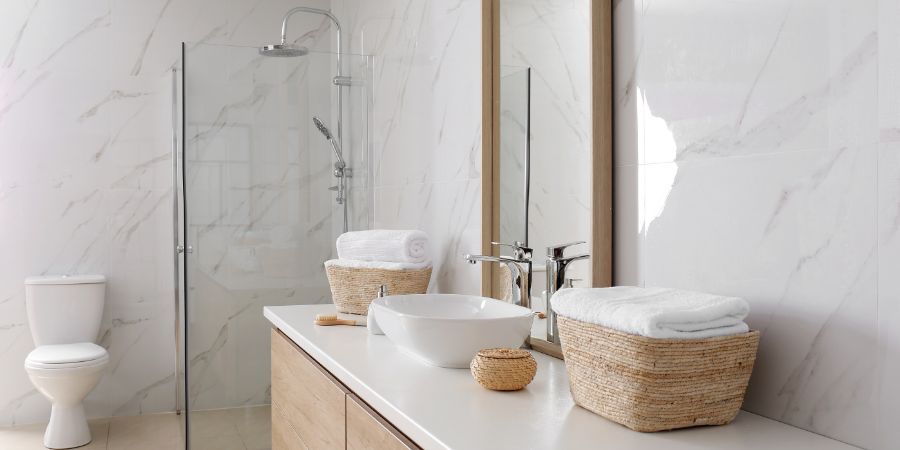
DON’T
1. Put the toilet in the wrong location.
One of the worst Feng Shui bathroom mistakes is putting the toilet in the wrong location. This is because your toilet is said to represent your ability to let go of what no longer serves you. So, if your toilet is in the wrong location, it’s said to represent a blockage in your ability to let go of what no longer serves you.
2. Keep expired medication.
Firstly, this is unsafe for your health -full stop. If you have expired medication in your bathroom, there’s a chance you could accidentally take it and become seriously ill.
On top of that, medication is said to represent illness and disease. So, if you have expired medication in your bathroom, it’s said to represent a blockage in your ability to heal and be healthy.
3. Store toilet paper and cleaning products in the wrong spot.
Your toilet paper and cleaning products should always be stored in a spot that’s easily accessible. This is because your toilet paper and cleaning products are said to represent your ability to cleanse and purify yourself. So, if they’re not easily accessible, it’s said to represent a blockage in your ability to cleanse and purify yourself.
However, you should never keep them on the floor or around the bath/shower area. This is because placing them there can block the flow of Chi, as well as possibly cause an accident (e.g. tripping). Instead, we recommend storing these items on a shelf or in a cupboard.
4. Use a lot of metal.
You should also avoid using a lot of metal in your bathroom. This is because metal is said to represent water.
Obviously, the bathroom already has a lot of water energy already. By using too much metal in your bathroom, it’s said to create an imbalance of this energy by going heavy-handed and representing too much water.
5. Hang heavy objects over the toilet.
Hanging heavy objects over the toilet is another big no-no. This is because your toilet is said to represent your ability to let go of what no longer serves you. So, if you have a heavy object hanging over it, it’s said to represent a blockage in your ability to let go of what no longer serves you.
Bedroom Feng Shui Dos and Don’ts
DO
1. Place the bed in a commanding position.
Your bed should always be placed in a commanding position. This means that you should be able to see the door from your bed, but your bed shouldn’t be in line with the door.
The reason for this is that your bed is said to represent you. So, if you can see the door from your bed, it’s said to represent a clear path and good flow of energy. However, if your bed is in line with the door, it’s said to represent a blockage in this flow of energy.
2. Make sure there’s room on both sides of the bed.
There should also be enough room on both sides of your bed for you to easily get in and out of it. This is because your bed is said to represent you and your ability to move freely. So, if there’s not enough room on either side of your bed, it’s said to represent a blockage in your ability to move freely.
3. Use a headboard.
Using a headboard is also important. This is because your headboard is said to represent your ability to support yourself. So, if you don’t have a headboard, it’s said to represent a lack of support in your life.
4. Keep the room (as well as your bed) clean and clutter-free.
This one should be pretty self-explanatory. A clean and clutter-free room (as well as bed) is said to represent a clear mind and good flow of energy. So, if your room is cluttered or dirty, it’s said to represent a blockage in this flow of energy.
5. Use calming and relaxing colors.
The colors you use in your bedroom are also important. You should stick to calming and relaxing colors, such as blue, green, and purple. These colors are said to represent peace and relaxation. By using these colors in your bedroom, it’s said to promote a sense of peace and relaxation.
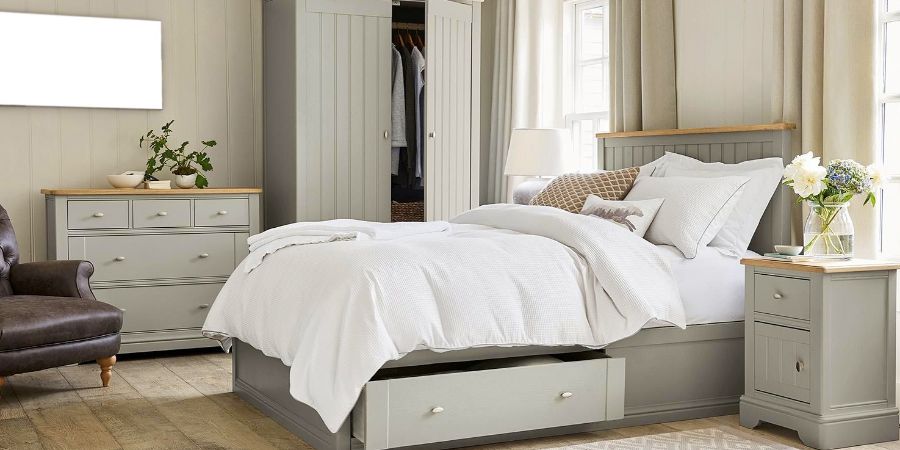
6. Use soft and inviting fabrics.
The fabrics you use in your bedroom are also important. You should stick to soft and inviting fabrics, such as cotton and linen. These fabrics are said to represent comfort and relaxation. By using these fabrics in your bedroom, it’s said to promote a sense of comfort and relaxation.
7. Make sure the room is well-lit.
It’s also important to make sure your bedroom is well-lit. This is because a well-lit bedroom is said to represent a bright future. So, if your bedroom is dark or poorly lit, it’s said to represent a bleak future.
8. Include some fresh flowers and plants.
Fresh flowers and plants are also said to be important in a bedroom. This is because they’re said to represent new beginnings and growth. So, by including fresh flowers and plants in your bedroom, it’s said to promote a sense of new beginnings and growth.
9. Hang up some art.
Hanging up some art is also said to be important in a bedroom. This is because art is said to represent self-expression. So, by hanging up some art in your bedroom, it’s said to promote a sense of self-expression.
10. Keep your bedroom for rest.
Finally, it’s important to keep your bedroom for rest. This means that you shouldn’t use your bedroom as a home office or a place to watch TV. After all, your bedroom is supposed to represent your sanctuary for rest and relaxation.
But if you use it for anything other than rest, it’s said to promote a sense of restless and anxious energy.
Fun Fact: Did you know you can become an internationally-certified Advanced Feng Shui Design Professional (AFDP) in as little as 3 short months by taking QC Design School‘s self-paced, online Feng Shui Design Course? It’s true!
DON’T
1. Place the bed in line with the door.
When it comes to Feng Shui, one of the most important things to keep in mind is the placement of your bed. You don’t want your feet pointing toward the door. Remember, your feet represent your ability to move forward in life.
So, if your bed is in line with the door, it’s said to represent a blockage in this flow of energy. And obviously, you don’t want this!
2. Place the bed against a window.
Another thing to keep in mind is the placement of your bed in relation to windows. You don’t want your head pointing toward a window. It’s believed that your head represents your ability to think clearly.
But when you place your bed is against a window, you’re preventing this flow of energy. Once again, you don’t want this! Instead, position your bed in a way that allows you to see the door and all the windows in the room.
3. Use too many mirrors.
Using too many mirrors in your bedroom is also said to be a bad idea. This is because mirrors are said to represent relationships. So, if you use too many mirrors in your bedroom, it’s said to promote a sense of restless and anxious energy when it comes to relationships.
4. Use bright colors.
As we mentioned before, the colors you use in your bedroom are also important. You should stick to calming and relaxing colors, such as blue, green, and purple. But avoid using bright colors, such as red, orange, and yellow. These colors are said to be too stimulating and can promote a sense of restless and anxious energy.
Of course, if you’re the type of person who loves bright, vibrant colors, you can absolutely still use them… We simply advise you to do it in moderation. For example, you might want to use these colors as accents – or throughout your decor – rather than painting the entire room with them.
All we’re saying is, just make sure they’re not the dominant colors in the room.
5. Use water energy outside of plant life.
You might also want to avoid using water energy outside of plant life. This means avoiding things like fountains, aquariums, and even pictures or paintings of waterfalls.
But why is this?
Well, water is said to represent your career. And if you use too much water energy in your bedroom, it’s said to promote a sense of restless and anxious energy when it comes to your career.
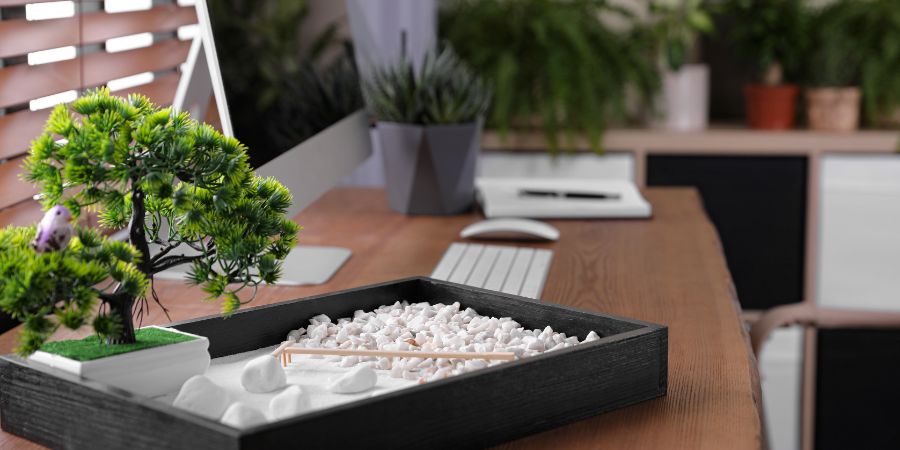
Feng Shui Tips For Your Office
Finally, let’s examine some dos and don’ts when it comes to Feng Shui in your office.
DO
1. Position your desk so that you can see the door.
When it comes to your desk, you want to position it in a way that allows you to see the door. This is because your desk represents your ability to work and make money.
But if you can’t see the door, it’s said to represent a blockage in this flow of energy. So, you definitely don’t want that!
2. Keep your desk clean and organized.
It’s also important to keep your desk clean and organized. This is because a cluttered or messy desk is said to represent a cluttered or messy mind. Obviously, you want to avoid this!
3. Decorate with plants.
Decorating your office with plants is also a great idea. This is because plants are said to represent growth. Some of the best plants to decorate your office space with are:
By having plants in your office, you’re promoting a sense of growth in your career!
4. Use the colors blue, green, and purple.
When it comes to the colors you use in your office, stick to calming and relaxing colors, such as blue, green, and purple. But avoid using bright colors, such as red, orange, and yellow. These colors are said to be too stimulating and can promote a sense of restless and anxious energy.
5. Use metal elements.
Another great way to promote a sense of balance and harmony in your office is to use metal elements. This includes things like a metal desk, metal decor, or even a metal plant holder. Incorporating metal elements is said to promote a sense of stability and order.
DON’T
1. Use too many earth elements.
While you definitely want to use some earth elements in your office – such as plants and metal decor – you don’t want to use too many. This is because earth elements are said to represent your health.
But the thing is, if you use too much earth energy in your office, it’s believed to promote a sense of restless and anxious energy when it comes to your health. So, instead, try to use a more balanced mix of elements.
2. Skimp out on a proper chair.
When it comes to your office chair, don’t skimp out on the quality of chair you buy/use! This is because your chair represents your ability to move forward in your career.
If you’re using a cheap or flimsy chair, it’s said to represent a blockage in your ability to successfully achieve this goal. So, make sure you’re using a sturdy and comfortable chair that will allow you to sit for long periods of time without getting uncomfortable.
3. Prevent positive energy flow.
In Feng Shui, it’s also said that you should avoid anything that might prevent positive energy from flowing freely throughout your office.
This means avoiding things like cluttered desktops, stacks of paperwork, or even a messy coat rack. Basically, you want to make sure there’s nothing in your office that might block the flow of good energy.
4. Use too much yang energy.
You also want to avoid using too much yang energy in your office. This means avoiding things like bright lights, loud music, or even a TV.
Too much yang energy is said to promote a sense of restless and anxious energy. So, you definitely want to avoid that!
5. Neglect the bagua map – especially for your desk area.
Finally, one of the most important Feng Shui tips is to make sure you’re paying attention to the bagua map – especially for your desk area.
If you’re not familiar with the bagua map, it’s basically a map that divides your space into nine sections. Each section represents a different area of your life. And when it comes to your office, you want to make sure your desk is in the “Career” section. This is because this section of the bagua map represents your ability to work and make money.
By having your desk in this section, you’re promoting a sense of success and abundance in your career.
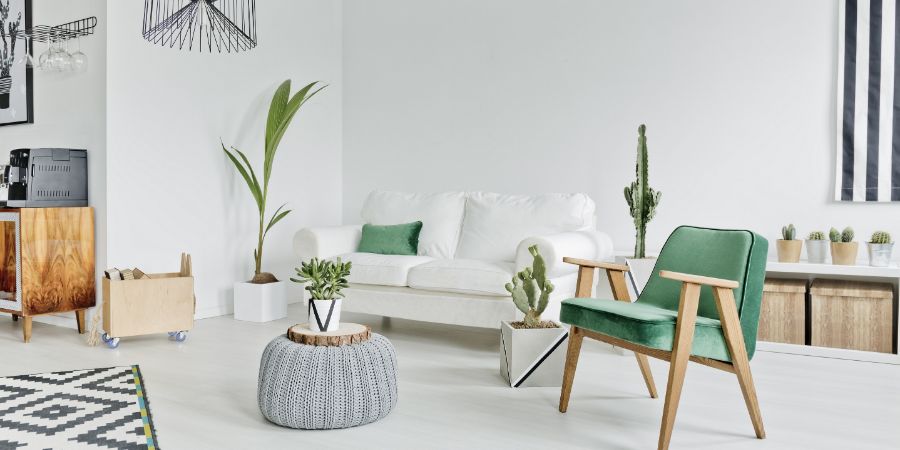
Conclusion
Well, there you have it! By following these tips, you can help promote a sense of balance and harmony in your work life. And who knows? Maybe even a little bit of success and abundance, too!
Do you have any other Feng Shui tips that you swear by? Share them with us in the comments below!
Thanks for reading! 🙂

